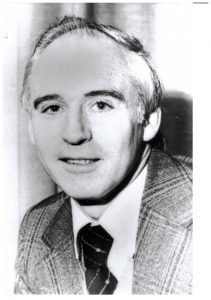The O’Raifeartaigh Lecture is held annually in honour of Lochlainn O’Raifeartaigh (1933 – 2000).
Throughout his career O’Raifeartaigh made seminal contributions to fundamental physics, which continue to influence the landscape of theoretical physics today. Following a DIAS research fellowship to work with the great Irish relativist J. L. Synge, O’Raifeartaigh obtained his PhD from the University of Zurich. After rejoining DIAS as an assistant professor, O’Raifeartaigh spent time at the Mathematical Science Institute in Madras, the University of Syracuse and the Institute for Advanced Study in Princeton. In 1968 O’Raifeartaigh returned to DIAS on a permanent basis as a Senior Professor and went on to build an internationally renowned group in theoretical high energy physics.
O’Raifeartaigh’s contributions to physics standout for both their depth and breadth. For instance, his 1965 “No Go Theorem”, prohibiting the non-trivial unification of spacetime and internal symmetries, was a profound insight that presaged an entire era of high energy theoretical physics. Similarly, his work on spontaneous supersymmetry breaking has been hugely influential over the course of the last 40 years. His highly original and deep contributions span an impressive array of topics in fundamental physics, always at the cutting edge of the time, from magnetic monopoles to Seiberg-Witten theory. O’Raifeartaigh received a von Humboldt Research Award in 1998 and the prestigious Wigner Medal in 2000 for his pioneering contributions to particle physics. He was elected a Member of the Royal Irish Academy at the age of 29, and was also a member of Academia Europea. O’Raifeartaigh was interested in the social implications of science and, in particular, was a co-founder of the Irish Pugwash movement.
The O’Raifeartaigh Lecture is held as a part of the annual Irish Theoretical Physics Conference (formerly Irish Quantum Foundations).
Previous Speakers:
2022 – Fay Dowker (Imperial College London)
2022 – John Ellis (CERN & King’s College London)
2019 – Nima Arkani-Hamed (IAS Princeton)
2018 – Duncan Haldane (Princeton University)
2017 – Fabian Essler (University of Oxford)
2016 – Michael Duff (Imperial College London)
2015 – Viatcheslav Mukhanov (Arnold Sommerfeld Center Munich)
2014 – Erik Verlinde (University of Amsterdam)
2013 – Nathan Seiberg (IAS Princeton)
2011 – Andreas Wipf (University of Jena)
2010 – Fedor Smirnov (Pierre and Marie Curie University Paris)
2009 – Nathan Berkovits (IFT Sao Paulo)
2008 – Valery Rubakov (INR Moscow)
2007 – Hubert Saleur (IPhT Saclay)
2006 – Juan Maldacena (IAS Princeton)
Leave a Comment
Last Updated: 19th April 2023 by Leron Borsten
The O’Raifeartaigh Lecture
The O’Raifeartaigh Lecture is held annually in honour of Lochlainn O’Raifeartaigh (1933 – 2000).
Throughout his career O’Raifeartaigh made seminal contributions to fundamental physics, which continue to influence the landscape of theoretical physics today. Following a DIAS research fellowship to work with the great Irish relativist J. L. Synge, O’Raifeartaigh obtained his PhD from the University of Zurich. After rejoining DIAS as an assistant professor, O’Raifeartaigh spent time at the Mathematical Science Institute in Madras, the University of Syracuse and the Institute for Advanced Study in Princeton. In 1968 O’Raifeartaigh returned to DIAS on a permanent basis as a Senior Professor and went on to build an internationally renowned group in theoretical high energy physics.
O’Raifeartaigh’s contributions to physics standout for both their depth and breadth. For instance, his 1965 “No Go Theorem”, prohibiting the non-trivial unification of spacetime and internal symmetries, was a profound insight that presaged an entire era of high energy theoretical physics. Similarly, his work on spontaneous supersymmetry breaking has been hugely influential over the course of the last 40 years. His highly original and deep contributions span an impressive array of topics in fundamental physics, always at the cutting edge of the time, from magnetic monopoles to Seiberg-Witten theory. O’Raifeartaigh received a von Humboldt Research Award in 1998 and the prestigious Wigner Medal in 2000 for his pioneering contributions to particle physics. He was elected a Member of the Royal Irish Academy at the age of 29, and was also a member of Academia Europea. O’Raifeartaigh was interested in the social implications of science and, in particular, was a co-founder of the Irish Pugwash movement.
The O’Raifeartaigh Lecture is held as a part of the annual Irish Theoretical Physics Conference (formerly Irish Quantum Foundations).
Previous Speakers:
2022 – Fay Dowker (Imperial College London)
2022 – John Ellis (CERN & King’s College London)
2019 – Nima Arkani-Hamed (IAS Princeton)
2018 – Duncan Haldane (Princeton University)
2017 – Fabian Essler (University of Oxford)
2016 – Michael Duff (Imperial College London)
2015 – Viatcheslav Mukhanov (Arnold Sommerfeld Center Munich)
2014 – Erik Verlinde (University of Amsterdam)
2013 – Nathan Seiberg (IAS Princeton)
2011 – Andreas Wipf (University of Jena)
2010 – Fedor Smirnov (Pierre and Marie Curie University Paris)
2009 – Nathan Berkovits (IFT Sao Paulo)
2008 – Valery Rubakov (INR Moscow)
2007 – Hubert Saleur (IPhT Saclay)
2006 – Juan Maldacena (IAS Princeton)
Category: The O'Raifeartaigh Lecture
School of Theoretical Physics
Recent Posts
Flavour Puzzles and the LHCb Experiment
Flavour Puzzles and the LHCb Experiment
Covariant Loop Quantum Gravity and Cosmology
Covariant Loop Quantum Gravity & Cosmology
Frame PB-groupoid of a VB-groupoid
Language switcher